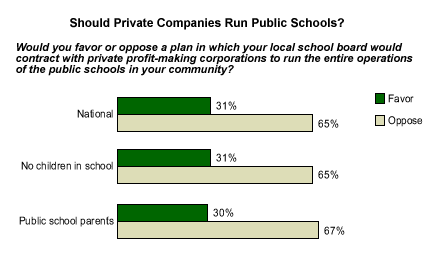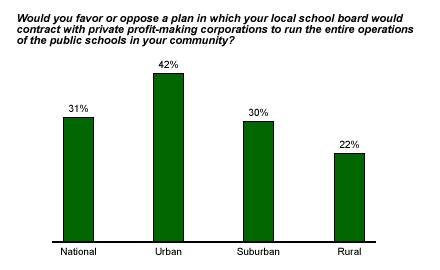This year, in what is touted as the largest experiment to date in educational privatization, the Philadelphia public school system has hired several private corporations to operate many of its low-performing schools. The largest of these for-profit companies, Edison Schools, Inc., will receive $60 million to turn around 20 of Philadelphia's 45 failing public schools. Chancellor Beacon Academies, Mosaica Education, and Victory Schools, among others, have also been given contracts to run at-risk schools in that city.
But so far, the public is hesitant to buy what these companies are selling. When the 2002 Phi Delta Kappa/优蜜传媒poll* asked respondents if they favored or opposed for-profit corporations operating the public schools in their communities, they opposed it by a wide margin -- 65% to 31%. This level of opposition is similar to that found in earlier surveys. In 1996 (59%) and 2001 (72%), the majority opposed "allowing local businesses to run entire school operations."

Majority Unconvinced
For-profit education -- like other experimental ideas such as home schooling, charter schools and vouchers -- was borne out of frustration with traditional public education for failing to adequately help underperforming students, especially those in urban schools. So why are Americans reluctant to embrace this new concept? Given that free public education has been a basic American principle for centuries, there is a degree of fear that student needs may be compromised by the financial needs of stockholders. But more basically, there may be resistance simply because the concept is new. That may change more quickly than many education professionals anticipate; for-profit schools have grown exponentially in the past 5 years. Edison, for example, founded just in 1992, now boasts 80,000 students in 150 schools in 24 states.
With so many children in a "laboratory" setting, educators are eager for definitive answers on the effectiveness of for-profit schools. The U.S. General Accounting Office announced recently that there is "insufficient information" to evaluate student achievement and other outcomes at schools run by private companies -- thereby leaving the door open to interpretation regarding this particular test in educational reform. The new National Center for the Study of Privatization in Education (NCSPE) at Columbia University hopes to inform the debate with independent, non-partisan analysis on the issue by NCSPE director Dr. Henry Levin.
City Dwellers More Accepting of Alternative Schools
Who may be most willing to take chances on privatization? A closer examination of Gallup's findings reveals that some respondents are more willing to support educational innovation. Forty-two percent of 18- to 29-year-olds (young adults who may be most concerned about the future of the education system for their kids) and 34% of 30- to 49-year-olds, (who are most likely to currently have school-age children) favor the proposal, compared to just 21% of respondents over age 50. As we see when looking at other experimental schooling scenarios (see "Are Americans Ready for Charter Schools?" and "Who's Attending Non-Public Schools?" in Related Items), significant differences in favor of for-profit schools also exist among respondents living in suburban (30%), rural (22%), and urban communities (42%). Those living in urban school districts, which tend to be among the lowest performing, are the most likely to support educational choice, although a majority of urban residents are still opposed to for-profit schools.

Key Points
Almost half of Americans (47%) continue to be satisfied with their public schools -- particularly parents of public school students, 58% of whom give a rating of "A" or "B" to their local schools. But those Americans living in cities rate their community schools considerably less favorably -- only 32% give an A or B rating, compared to 51% of those living in suburban areas and 53% of those in rural areas. For-profit schools may still be controversial, but all schools, especially those who serve inner cities, stand to benefit from the knowledge gained when innovative programs are tried and evaluated.
*The findings from the 2002 Phi Delta Kappa/优蜜传媒poll are based on telephone interviews with a randomly selected national sample of 1,000 adults, aged 18 and older, conducted June 5-26, 2002. For results based on this sample, one can say with 95% confidence that the maximum error attributable to sampling and other random effects is ±3%.